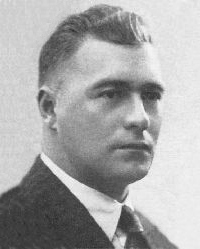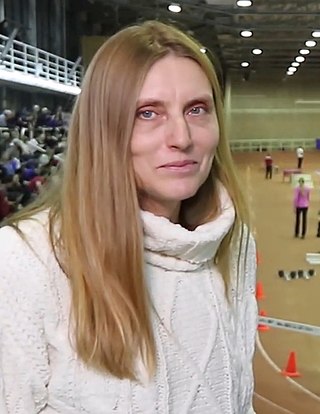
Irina Anatolyevna Privalova is a Russian Olympic gold medallist athlete. Her Summer Olympics debut was in 1992 in the sprint events, where she won two medals— a bronze in the 100 m and running the anchor leg in the 4x100 team, a silver — and came fourth in the 200, representing the Unified Team. With three European individual championships and three individual world medals, Irina Privalova had been a formidable competitor during most of the 1990s but had not yet won an outdoor international event gold medal.

William Harrison "Bones" Dillard was an American track and field athlete, who is the only male in the history of the Olympic Games to win gold in both the 100 meter (sprints) and the 110 meter hurdles, making him the “World’s Fastest Man” in 1948 and the “World’s Fastest Hurdler” in 1952.
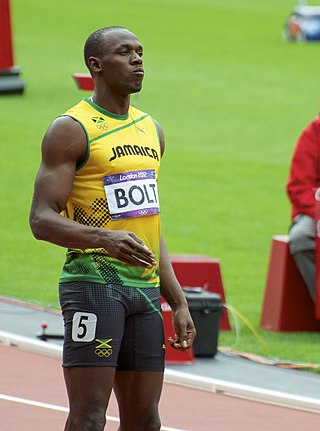
Sprinting is running over a short distance at the top-most speed of the body in a limited period of time. It is used in many sports that incorporate running, typically as a way of quickly reaching a target or goal, or avoiding or catching an opponent. Human physiology dictates that a runner's near-top speed cannot be maintained for more than 30–35 seconds due to the depletion of phosphocreatine stores in muscles, and perhaps secondarily to excessive metabolic acidosis as a result of anaerobic glycolysis.

Hurdling is the act of jumping over an obstacle at a high speed or in a sprint. In the early 19th century, hurdlers ran at and jumped over each hurdle, landing on both feet and checking their forward motion. Today, the dominant step patterns are the 3-step for high hurdles, 7-step for low hurdles, and 15-step for intermediate hurdles. Hurdling is a highly specialized form of obstacle racing, and is part of the sport of athletics. In hurdling events, barriers known as hurdles are set at precisely measured heights and distances. Each athlete must pass over the hurdles; passing under or intentionally knocking over hurdles will result in disqualification.

Tyson Gay is a retired American track and field sprinter who competed in the 100 and 200 meters. His 100 m personal best of 9.69 seconds is the American record and makes him tied for the second fastest athlete over 100 m ever, along with Yohan Blake of Jamaica.

Xavier Carter is an American retired professional track and field athlete. He attended Louisiana State University and was a star on the track and field team as well a member of the football team. Before LSU, Xavier Carter graduated from Palm Bay High School in Melbourne, Florida. He is the eleventh fastest sprinter in the 200 meters event with a personal best of 19.63 seconds.

Ralph Vernon Mann is a retired American sprinter and hurdler. He was an undergraduate at Brigham Young University, and later earned a Ph.D. in Biomechanics from Washington State University.
The men's 100 metres event was part of the athletics programme at the 1920 Summer Olympics. The competition was held on August 15 and 16, 1920. The event was won by Charley Paddock of the United States. Great Britain won its first medal in the event, a bronze by Harry Edward.
The men's 400 metres event was part of the track and field athletics programme at the 1920 Summer Olympics. The competition was held on Thursday, August 19, 1920, and on Friday, August 20, 1920. 37 runners from 16 nations competed. No nation had more than 4 runners, suggesting the limit had been reduced from the 12 maximum in force in 1908 and 1912. The event was won by Bevil Rudd of South Africa, the nation's first title in the event. Nils Engdahl's bronze was Sweden's first medal in the 400 metres.
Heino Lipp was an Estonian athlete, who was one of the greatest decathlete in the decade of the 1940s, but he was never able to compete in the Olympic Games, because citizens of the Soviet Union were never allowed to travel outside the Soviet Union dominated Iron Curtain countries. He also competed in the shot put, making 6 European records in the event.
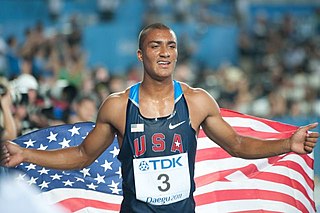
Ashton James Eaton is a retired American decathlete and two-time Olympic champion, who holds the world record in the indoor heptathlon event. Eaton was the second decathlete to break the 9,000-point barrier in the decathlon, with 9,039 points, a score he bettered on August 29, 2015, when he beat his own world record with a score of 9,045 points, and remains the only person to exceed 9000 points twice. His world record was broken by Frenchman Kevin Mayer on September 16, 2018, with a total of 9,126 points, who became the third man to pass the 9,000-point barrier.

The Michigan Wolverines men's track and field team is the intercollegiate track and field program representing the University of Michigan. The school competes in the Big Ten Conference in Division I of the National Collegiate Athletic Association (NCAA).
Charles Tidwell was an American track athlete who was one of the best sprinter/hurdlers in the world in the years 1958–60. He was denied a chance to run in the 1960 Olympics by injury.

The 100 metres at the Summer Olympics has been contested since the first edition of the multi-sport event. The men's 100 metres has been present on the Olympic athletics programme since 1896. The 100 metres is considered one of the blue ribbon events of the Olympics and is among the highest profile competitions at the games. It is the most prestigious 100 metres race at an elite level and is the shortest sprinting competition at the Olympics – a position it has held at every edition except for a brief period between 1900 and 1904, when a men's 60 metres was contested.
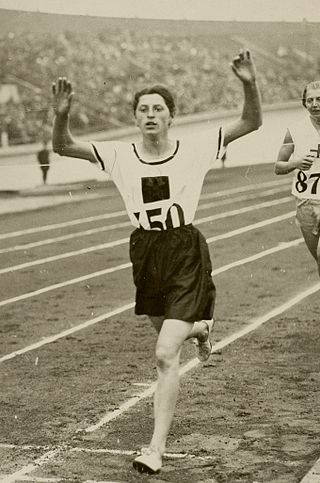
Maria "Marie" Dollinger-Hendrix was a German track and field athlete who competed in sprinting events and the 800 metres. She represented Germany at three consecutive Olympic Games: 1928, 1932 and 1936.

The sprint hurdles at the Summer Olympics have been contested over a variety of distances at the multi-sport event. The men's 110 metres hurdles has been present on the Olympic athletics programme since the first edition in 1896. A men's 200 metres hurdles was also briefly held, from 1900 to 1904. The first women's sprint hurdling event was added to the programme at the 1932 Olympics in the form of the 80 metres hurdles. At the 1972 Games the women's distance was extended to the 100 metres hurdles, which is the current international standard.
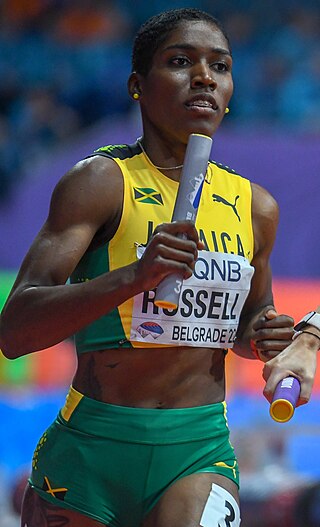
Janieve Russell is a Jamaican track and field athlete who competes mainly in the 400 metres hurdles and the 400 metres sprint. She won an Olympic bronze medal in the 4 × 400 m relay in Tokyo 2021, where she also finished fourth in the 400m hurdles final in a personal best of 53.08 secs. She is a four-time Commonwealth Games gold medallist, winning the 400m hurdles title in 2018 and 2022, and the 4 × 400 m relay in 2014 and 2018. She has also won two relay silvers at the World Championships and a relay gold at the World Indoor Championships.

Ali Khamis Abbas Ali Khamis is a Bahraini track and field athlete who competes mainly in the 400 metres sprint and 400 metres hurdles. His personal best for the flat event is 44.36 seconds, set in 2013, while his hurdles best is 49.55 seconds, set in 2014. He was the 2014 Asian Games champion in the hurdles and the runner-up in the sprint at the 2013 Asian Athletics Championships

Kendra "Keni" Harrison is an American hurdler. Harrison held the world record in the women's 100 metres hurdles with a time of 12.20 seconds, set on July 22, 2016 at the London Müller Anniversary Games, breaking the previous world record of 12.21 seconds achieved nearly 28 years earlier by Bulgarian athlete Yordanka Donkova.

Sydney Michelle McLaughlin-Levrone is an American hurdler and sprinter who competes in the 400 meters hurdles and is the world record holder in that event. She has won gold in the 2020 and 2024 Summer Olympics, as well as the 2022 World Athletics Championships. She set a world record time of 50.37 seconds at the 2024 Summer Olympics on August 8, 2024, breaking her own old world record of 50.65 seconds. She is the first track athlete to break four world records in the same event; setting four world records during 13 months, she was the first woman to break the 52-second and 51-second barriers in the 400 m hurdles. She won the silver medal at the 2019 World Championships. At all four competitions, she also took gold as part of a women's 4 × 400 m relay team.
